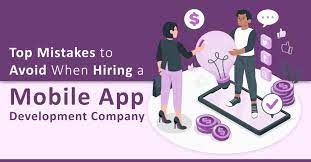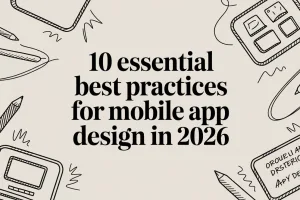When hiring a mobile app developer remotely in the US, it’s crucial to navigate the process diligently to ensure a successful partnership. Firstly, never underestimate the importance of effective communication skills. Clear and timely communication is the lifeblood of remote work, so ensure that the developer can express themselves well and is responsive.
Secondly, a mistake to avoid is rushing the hiring process. Take your time to evaluate candidates thoroughly through interviews, technical assessments, and reference checks. Rushed decisions can lead to mismatches between the developer and your project.
Thirdly, pay attention to cultural fit. Remote teams require a strong alignment with your company’s values and work culture to collaborate effectively. Overlooking this can result in conflicts and reduced productivity.
Fourthly, while cost is a consideration, don’t make it the sole determining factor. Opting for the cheapest developer may compromise the quality of your app. Balance cost considerations with skills and experience.
Fifthly, ensure you set clear expectations from the outset. Misunderstandings and delays can occur if project scope, timeline, and objectives are not clearly communicated and understood.
Sixthly, remember that mobile apps often deal with sensitive data. Neglecting security and compliance requirements can have severe consequences. Verify that the developer follows security best practices.
Seventh, be open to developer input and innovation. Avoid micromanaging and allow room for creativity within the project’s defined scope.
Eighth, comprehensive contracts protect both parties. Take time to negotiate contracts that cover scope, payment terms, deadlines, intellectual property rights, and dispute resolution mechanisms.
Lastly, test the developer’s proficiency with your team’s remote communication and collaboration tools. This ensures a smooth workflow and minimizes potential tech-related issues. By steering clear of these common hiring mistakes, you can establish a successful and productive partnership with your chosen mobile app developer.
Importance of an App Developer
An app developer plays a pivotal role in the modern digital landscape, and their importance cannot be overstated. They are the architects behind the creation of mobile applications, which have become essential tools for individuals and businesses alike.
First and foremost, an app developer brings ideas to life. They possess the technical expertise to transform concepts into functional, user-friendly applications. These apps can streamline operations, enhance user experiences, and boost revenue for businesses.
Moreover, app developers contribute to innovation. They continually explore new technologies and trends, ensuring that apps remain cutting-edge. This innovation drives the digital ecosystem forward, enabling users to access novel solutions and experiences.
Security is another critical aspect. App developers prioritize data protection and cybersecurity. They implement robust security measures to safeguard user information, ensuring trust and compliance with regulations.
App developers also support economic growth. They create job opportunities and stimulate entrepreneurship by enabling startups and businesses to reach broader audiences through mobile apps.
In conclusion, app developers are the backbone of the app economy. Their skills, creativity, and dedication are instrumental in shaping our digital world, driving progress, and improving countless aspects of our lives. Their importance lies not only in the code they write but also in the transformative potential of the apps they create.
Mistakes To Avoid While Hiring Mobile App Developers

Avoiding mistakes during the hiring process for mobile app developers is crucial for the success of your project. Firstly, overlooking a developer’s portfolio can be a grave error. Assess their past work to gauge their skills and quality of apps they’ve built. A comprehensive portfolio offers valuable insights.
Secondly, rushing the hiring process is a common pitfall. Take the time to evaluate candidates thoroughly. Conduct multiple rounds of interviews and technical assessments to ensure you find the right fit for your project.
Thirdly, neglecting communication skills is a significant mistake. Effective communication is vital, especially in remote work scenarios. Ensure that the developer can convey ideas clearly and maintain timely interactions.
Fourthly, solely focusing on cost can lead to problems. While cost is a factor, it shouldn’t be the sole criterion. Opting for the cheapest option can compromise the quality and performance of your app.
Fifthly, cultural fit matters. Overlooking this aspect can lead to conflicts and hinder collaboration. Assess whether the developer aligns with your company’s values and work culture.
Sixthly, not setting clear expectations can result in misunderstandings. Establish a well-defined project scope, timeline, and objectives to ensure everyone is on the same page.
Seventh, ignoring security and compliance is a risky move. Mobile apps often deal with sensitive data, so it’s crucial that the developer understands and follows security best practices.
In conclusion, avoiding these mistakes during the hiring process will help you build a successful partnership with your chosen mobile app developer, resulting in a high-quality and functional app that meets your business objectives.
What is the role of a portfolio in the hiring process for a mobile app developer?
A portfolio is an invaluable asset in the hiring process for a mobile app developer. It serves as a tangible showcase of a developer’s skills, experience, and abilities. Here’s a detailed look at the role of a portfolio:
Demonstrating Competence :
A portfolio provides concrete evidence of a developer’s competence. It showcases their proficiency in various programming languages, frameworks, and tools. By examining past projects, employers can gauge the depth of a developer’s technical knowledge and expertise.
Quality Assurance :
Portfolios allow employers to assess the quality of work a developer has produced. They can inspect the user interfaces, functionalities, and overall design of previous apps. This firsthand view helps in evaluating whether the developer’s style and standards align with the company’s expectations and requirements.
Problem-Solving Skills :
Mobile app development often involves solving complex problems. Portfolios highlight a developer’s problem-solving abilities by revealing the challenges they’ve encountered and how they addressed them. This insight is invaluable in determining a developer’s ability to overcome hurdles in your project.
Diversity of Experience :
A well-rounded portfolio may showcase a range of projects, demonstrating versatility. It allows employers to see if the developer has experience in different domains, such as e-commerce, healthcare, gaming, or fintech. This diversity can be advantageous, especially if your project requires expertise in a specific industry.
Coding Practices :
By examining the code samples provided within a portfolio, employers can assess a developer’s coding practices. They can evaluate factors like code readability, organization, and adherence to best practices. Clean, well-documented code is essential for maintainable and scalable applications.
Innovation and Creativity :
Portfolios reveal a developer’s creativity and innovation. Employers can see how they’ve approached user experience design, implemented unique features, or found inventive solutions to common problems. This creativity can be a significant asset in making your app stand out.
Experience with Technologies :
It’s crucial to know if a developer has experience with the specific technologies your project requires. A portfolio often lists the technologies used in each project, helping you identify candidates with the right technical stack.
Client and Team Collaboration :
Some portfolios may include information about the developer’s collaboration with clients or team members. This provides insights into their communication and teamwork skills, which are vital in a collaborative development environment.
In conclusion, a portfolio is an indispensable tool for evaluating a mobile app developer’s qualifications and suitability for your project. It offers a comprehensive view of their skills, accomplishments, and work style, allowing you to make an informed hiring decision that aligns with your project’s goals and expectations.
How can remote hiring for a mobile app developer be conducted effectively?
Effective remote hiring for a mobile app developer involves a structured approach that ensures you find the right talent for your project while mitigating potential challenges. Here’s a comprehensive guide to conducting remote hiring effectively:
Define Your Requirements Clearly :
Start by outlining your project’s specific requirements, including the technology stack, skills, and experience needed. This clarity will help you identify suitable candidates.
Use Reputable Job Platforms :
Utilize reputable job platforms and professional networks to post your job listings. Websites like LinkedIn, Stack Overflow, and specialized tech job boards are excellent places to find skilled developers.
Thoroughly Review Portfolios :
Ask candidates to provide portfolios showcasing their past projects. Examine their work to assess their skills, coding practices, and the quality of apps they’ve developed.
Conduct Multiple Interview Rounds :
Remote hiring should involve several interview rounds. Initial screenings can assess technical skills, while subsequent interviews can delve into cultural fit, communication abilities, and problem-solving skills.
Technical Assessments :
Implement technical assessments or coding tests to evaluate a developer’s practical abilities. These tests can simulate real-world scenarios and gauge problem-solving skills.
Check References :
Contact references provided by the candidates to validate their work history and assess their past performance in remote work situations.
Assess Communication Skills :
Effective communication is crucial in remote work. Evaluate a candidate’s ability to communicate clearly and proactively, as this will play a pivotal role in successful collaboration.
Utilize Video Conferencing :
Conduct video interviews to establish a more personal connection with candidates. It also allows you to gauge their professionalism and adaptability to remote work environments.
Evaluate Soft Skills :
Remote work requires strong time management, self-discipline, and collaboration skills. Assess a candidate’s soft skills during interviews to ensure they are a good fit for remote work.
Trial Period :
Consider offering a trial period or a small project to assess a developer’s performance and compatibility with your team before committing to a long-term contract.
Emphasize Security :
Ensure candidates understand and can adhere to your security and data protection protocols, especially if your app deals with sensitive information.
Contract and Onboarding :
Once you’ve selected a candidate, clearly define the terms in the contract, including payment, deadlines, and intellectual property rights. Create a robust onboarding process to integrate the developer smoothly into your remote team.
Effective Tools and Communication :
Provide the necessary tools and communication platforms to facilitate seamless remote work. Tools like Slack, Zoom, or project management software can enhance collaboration.
In conclusion, effective remote hiring for a mobile app developer involves a combination of clear requirements, thorough assessments, effective communication, and the right tools. Following these steps ensures you find a qualified developer who can contribute effectively to your project, regardless of their location.
FAQ’S
Q1: What are the common mistakes when hiring a mobile app developer remotely in the US?
A1: Common mistakes include neglecting communication skills, rushing the hiring process, overlooking cultural fit, focusing solely on cost, not setting clear expectations, ignoring security and compliance, and not thoroughly reviewing a developer’s portfolio.
Q2: How important is cultural fit when hiring a remote mobile app developer?
A2: Cultural fit is crucial, even in remote work scenarios. It ensures that the developer aligns with your company’s values and work culture, reducing the potential for conflicts and fostering effective collaboration.
Q3: Should cost be the primary factor in hiring a mobile app developer?
A3: While cost is important, it should not be the sole determining factor. Choosing the cheapest developer can compromise the quality and performance of your app. Balancing cost considerations with skills and experience is essential.
Q4: How can clear expectations be set when hiring a remote developer?
A4: Clear expectations can be established by defining the project scope, timeline, objectives, and deliverables in detail. Effective communication is key to ensuring everyone is on the same page.
Q5: Why is security and compliance important when hiring an app developer?
A5: Security and compliance are vital because mobile apps often handle sensitive data. Ensuring that the developer understands and follows security best practices helps protect user information and prevents legal and reputational issues.

















